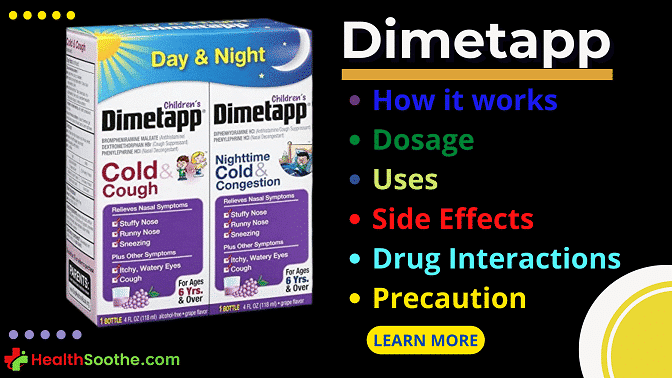Dimetapp is a combined medication designed to address symptoms resulting from the common cold, flu, allergies, hay fever (allergic rhinitis), or other respiratory conditions like sinusitis and bronchitis. It encompasses a cough suppressant, a decongestant, and an antihistamine.
Dextromethorphan, a cough suppressant, acts on a specific part of the brain (cough center), diminishing the urge to cough. Decongestants assist in alleviating symptoms of nasal congestion, while antihistamines relieve watery eyes, itchy eyes/nose/throat, runny nose, and sneezing.
It's important to note that cough and cold medications have not demonstrated safety or effectiveness in children under 6 years old. Consequently, unless expressly directed by a doctor, Dimetapp should not be used to treat cold symptoms in children under 6 years of age. Additionally, certain forms of Dimetapp, such as long-acting tablets/capsules, are not recommended for use in children under 12 years old. For guidance on safe and effective product use, consult your doctor.
Medications do not cure or shorten the duration of the common cold and may have serious side effects. To minimize the risk of adverse effects, adhere strictly to dosage instructions. Avoid using Dimetapp to induce drowsiness in children and refrain from using other cough and cold medications that may contain the same ingredients as Dimetapp.
Consult your doctor about alternative methods to alleviate cough and cold symptoms, such as staying hydrated, using a humidifier, or employing saline nasal drops/spray.
Dimetapp is indicated for the following conditions:
- Cold symptoms
- Allergic rhinitis
- Vasomotor rhinitis
- Nasal congestion
- Runny nose
- Cough
Dimetapp is contraindicated in the following cases:
- Overactive thyroid gland
- Angle-closure glaucoma
- High blood pressure
- Peptic ulcers
- Bladder obstruction
- Prostate enlargement
- Incontinence
- Chronic idiopathic constipation
- Systemic leukocytosis
- Acidosis
- High blood acidity
- Uncontrolled high blood pressure
- A heart attack
- Coronary artery disease
- Ventricular tachycardia
- Bradycardia
- Chronic heart failure
- Severe arterial stiffness
- A blood clot in an artery
- Acute hepatitis
- Acute pancreatitis
- Decreased oxygen in tissues or blood
Dimetapp may cause allergies in individuals reacting to:
- Dextromethorphan analogues
- Sympathomimetics
- Ephedrine analogues
- Antihistamines
- Antihistamines - Alkylamine
How to use Dimetapp
If you are using Dimetapp without a prescription from your doctor, carefully read all the instructions provided on the product packaging before taking it. If your doctor has prescribed Dimetapp, follow the specific instructions given by your doctor. Take Dimetapp orally, either on an empty or full stomach, with a full glass of water (8 ounces or 240 milliliters), or as directed by your doctor.
If you experience stomach upset, Dimetapp can be taken with food or milk. When using Dimetapp in liquid form, use a medication meter to accurately measure the prescribed dose. If the liquid form is a suspension, shake the bottle well before each use. For Dimetapp extended-release capsules, swallow the tablet whole—do not crush or chew the capsules or slow-release tablets, as doing so may release the medication all at once, increasing the risk of side effects. Do not split the extended-release tablets unless they are marked, and your doctor or pharmacist advises you to do so. Chew the chewable form of Dimetapp thoroughly before swallowing.
If you are taking Dimetapp in powder form, mix it thoroughly with the appropriate amount of liquid and stir well. Consume all the liquid immediately. The dosage of Dimetapp is determined based on your age, medical condition, and response to therapy.
If using Dimetapp to alleviate allergy or hay fever symptoms, take it regularly to maximize its benefits. Improper use or abuse of Dimetapp can result in serious harm, including brain damage, seizures, and even death. Do not exceed the prescribed dose, take Dimetapp more frequently, or use it for a longer duration than directed. If your condition persists or worsens after using Dimetapp, inform your doctor. Refrain from taking Dimetapp for several days before undergoing an allergy test, as it may affect the accuracy of the test results.
Read Also: Trigoxin Medicine: Uses and Side Effects
Pros and Cons of dimetapp
Pros of Dimetapp
- Effective Symptom Relief
- Versatility
- Multiple Formulations
- Ease of Use
Cons of Dimetapp
- Side Effects
- Not Suitable for Young Children
- Potential for Misuse
Differences Between dimetapp and hydroxyzine
Dimetapp
Dimetapp is an over-the-counter medication commonly used to relieve symptoms associated with the common cold, flu, allergies, hay fever (allergic rhinitis), sinusitis, and bronchitis. It typically contains a combination of a cough suppressant, a decongestant, and an antihistamine.
Hydroxyzine
Hydroxyzine is an antihistamine medication primarily used for the treatment of allergic reactions, itching (pruritus), and anxiety. It may also be used as a sedative before medical procedures or for the management of nausea and vomiting.
Alternative to dimetapp
Claritin-D or Allegra-D
- Purpose: These medications combine an antihistamine with a decongestant.
- Active Ingredients: Loratadine (Claritin-D) or fexofenadine (Allegra-D) with pseudoephedrine.
- Symptom Relief: Allergy symptoms such as sneezing, runny nose, and congestion.
side effects of Dimetapp
During the use of Dimetapp, you may experience certain side effects such as drowsiness, dizziness, headache, blurred vision, abdominal pain, nausea, constipation, or dry mouth/nose/throat. If any of these effects persist or worsen, it is important to inform your doctor promptly.
To alleviate dry mouth, you can try sucking on hard candy (sugar-free) or shaved ice, chewing sugar-free gum, drinking water, or using a saliva substitute. Dimetapp has the potential to dry and thicken mucus in your lungs, making breathing and lung clearance more challenging. To counteract this effect, it is recommended to drink plenty of fluids, unless otherwise directed by your doctor.
If your doctor has prescribed Dimetapp, it means they have weighed the benefits against the risk of potential side effects. Many individuals use Dimetapp without experiencing serious side effects. However, you should promptly notify your doctor if you encounter any rare but serious side effects, such as mental/mood changes (e.g., confusion, hallucinations), tinnitus, tremor, difficulty urinating, or weakness.
Seek immediate medical attention if you experience very rare but severe allergic reactions to Dimetapp, including symptoms like rash, itching/swelling (especially on the face, tongue, or throat), severe dizziness, or trouble breathing.
Below are the likelihoods of Dimetapp side effects:
Common side effects of Dimetapp include:
- Increased thickness of parts of the lungs
- Dizziness
- Drowsiness
Less common side effects of Dimetapp include:
- Creates an unusual state of comfort
Rare side effects of Dimetapp include:
- Blood disorders
- Anaphylaxis
- Anemia
- Hemolytic anemia
- Irregular heartbeat
- Excessive sweating
- Heart palpitations
- Hallucinations
- Headache
- Loss of skin color
- Low blood pressure
- Muscle tremors
- Anxiety
- Convulsions
- Vomiting
- Changes in vision
- Irritability
- Tingling sensation on the skin
- Migraine
- Skin rash
- Full stomach
- Refreshing
- Incontinence
- Feeling anxious
- Chest discomfort
- Chills
- Confusion
- Decreased appetite
- Diarrhea
- Difficult or painful urination
- Difficulty sleeping
- Double vision
- Dry nose
- Heart pounding
- Increased skin sensitivity to the sun
- Severe stomach pain
- Intense irritability
- Itching
- Loss of muscle coordination
- Low energy
- Nausea
- Nightmares
- Overexcitement
- Tinnitus
- Rotating sensation
- Stomach cramps
- Sore throat
- Difficulty breathing
- Wheezing
This list does not cover all potential side effects of Dimetapp. If you notice any other effects not mentioned above, it's crucial to contact your doctor.



